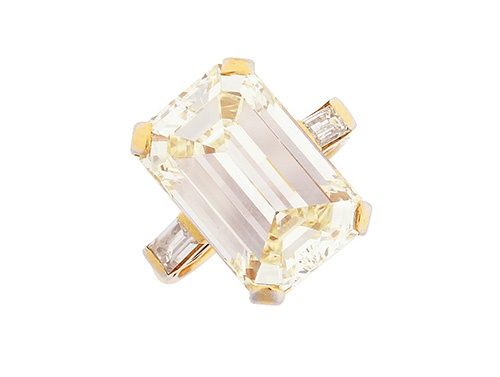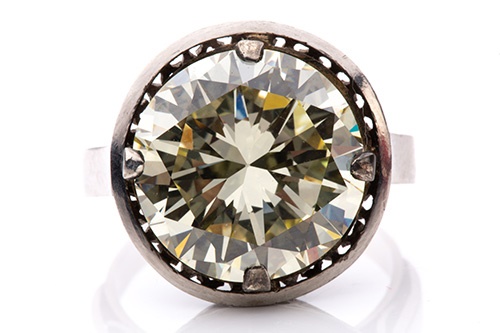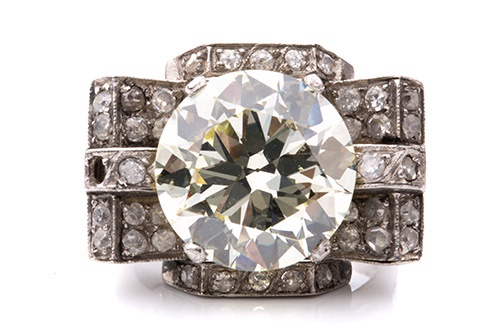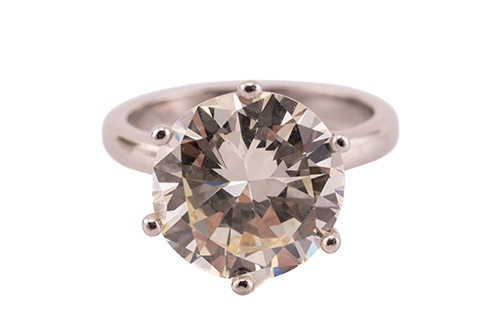Are Synthetic Diamonds Ethical?
Unearthing the less environmentally friendly side of lab grown diamond production
21/02/2023
Also known as lab-grown diamonds, synthetic diamonds are created in a laboratory setting using advanced technological processes that simulate the natural conditions that produce diamonds.
The process involves taking a small diamond seed or carbon source, and applying high pressure and high temperature, or chemical vapour deposition techniques, to mirror the natural process. The result of which, is a diamond that possesses the same physical and chemical properties as a natural diamond.
A rare 11.03ct diamond three-stone Kutchinsky's ring
Synthetic diamonds are often declared as a more ethical and environmentally friendly alternative to natural diamonds. With one of the primary arguments in favour of synthetic diamonds being that they are energy-efficient, as they do not require the extensive mining and processing that natural diamonds do.
However, recent research has called into question the notion that synthetic diamonds are a more energy-efficient option, as the energy consumption required to produce them can be significant.
The production of synthetic diamonds involves a complex and energy-intensive process that requires a considerable amount of heat and electricity. The most common method of producing synthetic diamonds is through high-pressure, high-temperature (HPHT) technology, which involves subjecting a small diamond seed or carbon source to extremely high pressure and temperature in a laboratory setting. The process requires large amounts of electricity to power the equipment and generate the heat needed to produce the diamonds.
According to a 2020 report by the consulting firm Trucost, the energy consumption required to produce one carat of synthetic diamonds is approximately 511kWh, which is roughly equivalent to the average amount of energy consumed by a household in the United States over the course of two weeks. In comparison, the energy required to mine and process one carat of natural diamonds is estimated to be between 160 and 600kWh, depending on the specific mining practices used. This means that in many instances, synthetic diamonds may in fact require more energy to produce than natural diamonds.
In addition to the energy required to produce synthetic diamonds, there are also environmental impacts associated with the manufacturing process. The production of synthetic diamonds can result in greenhouse gas emissions, particularly if the electricity used to power the manufacturing process is generated from fossil fuels. Additionally, the production of synthetic diamonds can generate waste materials and chemicals that can have negative impacts on the environment if not properly managed.
An Art Deco style diamond cocktail ring
It is important to note that not all synthetic diamond production methods are created equal when it comes to energy efficiency. Chemical vapor deposition (CVD) technology, for example, is a newer method of producing synthetic diamonds that is believed to be more energy-efficient than HPHT technology.
CVD technology involves depositing a carbon source onto a substrate using a gas mixture and an energy source, such as microwaves or lasers. The process does not require the same high levels of heat and pressure as HPHT technology and can be done at lower temperatures, potentially reducing the energy required.
However, despite the potential energy savings associated with CVD technology, the production of synthetic diamonds is still a highly energy-intensive process. It is also worth noting that the energy consumption associated with synthetic diamonds can vary depending on a number of factors, including the specific production method used, the size and quality of the diamonds being produced, and the source of the electricity used to power the manufacturing process.
Cartier, London. An Art Deco diamond bracelet with articulated geometric panel links
It is often argued that natural diamonds are a better investment than synthetic diamonds due to their rarity and historical value. Natural diamonds have been traded as luxury goods for centuries and are often associated with status and prestige. As a result, natural diamonds tend to hold their value over time and can even appreciate in value, making them an attractive investment option for those who are looking for a long-term return on their investment.
On the other hand, synthetic diamonds are a relatively new product and may not have the same historical or cultural significance that natural diamonds possess. While synthetic diamonds may offer a more ethical alternative to natural diamonds, they may not be the best choice for those looking to make a significant investment in the diamond market. Ultimately, the decision of whether to invest in natural or synthetic diamonds depends on a variety of factors, including personal values, financial goals, and ethical considerations.
Therefore, while synthetic diamonds are often touted as a more energy-efficient and environmentally friendly alternative to natural diamonds, more awareness must also be raised to the harmful side effects of growing diamonds in laboratories. Moreover, those who are concerned about the environmental impacts of diamond production in general, may actually want to consider alternatives to both natural and synthetic diamonds, such as recycled diamonds or other gemstones.
A diamond solitaire ring in platinum
Now more than ever, valuing diamond jewellery requires experience and knowledge, with formal training and the necessary gemmological qualifications an imperative prerequisite. Here at Dawsons, all of our jewellery specialists hold gemmology qualifications ensuring that every piece of jewellery is inspected thoroughly, whilst diamonds are sized and graded correctly in order to accurately describe them for valuation purposes.
Our expert team use state of the art technology and equipment to help us test all diamonds in order to confirm whether they are natural or synthetic. Additionally, the Dawsons jewellery team work closely with De Beers who can provide a formal certification service, whenever required.
Do you have any diamond jewellery that you are looking to sell?
The team of experts at Dawsons are always happy to provide a free appraisal in person at our saleroom in London, our valuation office in Berkshire, or from the comfort of your own home via a home visit or our online valuation service.
We can also provide insurance valuations, where required.
Please do get in touch, we would love to hear from you.
0207 431 9445 info@DawsonsAuctions.co.uk




